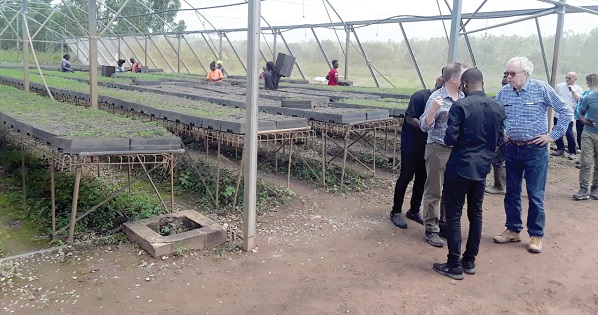AstraZeneca and the Circular Bioeconomy Alliance (CBA) have teamed up to support farmers in the Bono East Region through the Living Lab project, which aims to increase soil fertility and encourage farmers to plant cash crops like cashew.
This will assist farmers in increasing and diversifying their incomes.
The five-year project also aims to rehabilitate the Atebubu and Wiase forests’ forest landscapes, with 4.5 million trees planted by 2025.
Andrew Heald, a Director of the New Generation Plantations Technical Assistance (NGPTA) providing technical assistance for the project, said in an interview after a field trip to the project sites: “What we are trying to do with this project is find a balance between forest restoration, agroforestry development, and growing sustainable crops.”
According to him, the technical team spoke with local communities to hear about the farmers’ concerns and how the loss of trees was affecting their lives and livelihood.
“So what we’re attempting to do is strike a balance between natural forest restoration with indigenous trees and cashew and mango production for local farmers to diversify their earnings,” he explained.
Gains
The project, according to Mr Heald, is currently benefiting 11 towns in the Bone East Region.
“The project began two years ago on paper, but we began planting in February of last year, and we planted 150,000 trees.”
“We intend to plant 500,000 trees this year.” In the first week of May, we recently handed 12,000 seedlings to the farmers,” he said.
Barbara Nel, President of AstraZeneca’s Sub-Saharan Africa Business, said in a separate interview that the pharmaceutical company planned to plant 50 million trees globally by the end of 2025, with 4.5 million in Ghana.
She stated that the corporation would work with local governments and non-profit organizations to accomplish this.
“Pharmaceuticals are our core business, and we’ve been in Africa for 50 years.” “We will stay in Africa and collaborate with the ministries of health and government, as well as develop programs like this,” she remarked.
“I am thrilled to have been able to meet community leaders, local farmers, and other stakeholders involved in this Living Lab and to experience first-hand the good impact,” she said of the project.
“We can make a difference if we work together.” Working with local communities, respecting local knowledge and traditions, and combining them with cutting-edge technology and multi-sectoral experience is assisting in the restoration of local livelihoods and the development of sustainable communities, she noted.
Platform for stakeholders
Anthony Owusu, the Chairman of the Multi-Stakeholder Platform formed to drive the project, said the platform had created an outlet where farmers and opinion leaders could come together to make decisions that benefited both parties and their communities.
He praised the technical staff for delivering seedlings and inputs before the rainy season began.
“We told them that owing to the weather if they wanted to help us, the seeds needed to arrive by April-May, and thankfully, they met that goal and delivered all of the seeds by the first week of May.”
“This concept has piqued our interest as farmers. We’ve always wanted to start growing cashews, but finding the right seeds and inputs has been difficult. As a result, we’re lucky that this project came in,” he said.

